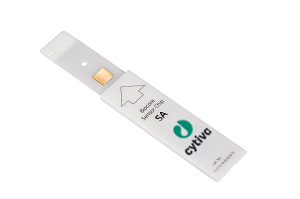DESCRIPTION
This high-affinity streptavidin (SA) sensor chip immobilizes biotinylated molecules for surface plasmon resonance (SPR) interaction analysis on Biacore systems.
Versatile: immobilizes biotinylated peptides, proteins, nucleic acids, or carbohydrates
Ready-to-use: streptavidin is pre-immobilized, ready for fast, high-affinity ligand capture
Robust: streptavidin-biotin is one of the strongest non-covalent interactions in nature
Non-covalent: a convenient alternative for ligands refractory to covalent immobilization
Standardized ligand orientation: controlled biotinylation enables oriented capture
Streptavidin-biotin capture
Sensor Chip SA provides a surface of streptavidin covalently attached to a carboxymethyldextran matrix. Dissociation of biotinylated ligands from the surface of the chip is generally negligible during the course of a Biacore analysis because the affinity of streptavidin for biotin is extremely high, with an equilibrium dissociation constant of about 10-15 M. High binding capacity, reproducibility, and chemical resistance give excellent performance over a broad range of applications. The surface of Sensor Chip SA is resistant to 1-minute pulses of many agents commonly used in SPR sensor chip washing and regeneration protocols (Table 1).
Agent
Concentration
Acetonitrile
30%
DMSO
10%
DTE
0.1 M
EDTA
0.35 M
Ethanol
70%
Ethanolamine
1 M
Ethynel glycol
100%
Formamide
40%
Formic acid
20%
Glycine pH 1.5 to 3.0
100 mM
HCI
100 mM
Imidazole
300 mM
MgCI2
4 M
NaOH
100 mM
NaCI
5 M
SDS
0.5%
Surfactant P20
5%
Urea
8 M
Table 1. Common agents compatible with Sensor Chip SA (see also Instruction 22-0564-88 AD)
Biacore Sensor Chip SA applications
Biotin has become a popular molecular tag for capture and interaction studies because it is stable and rarely interferes with target activity or structure due to its small size. Biotin can be conveniently conjugated to a wide range of target molecules by chemical or enzymatic means. Applications for Sensor Chip SA are therefore broad. Examples include:
capture of intact liposomes for protein-membrane interaction studies
screening of endocrine-disrupting chemicals
elucidating DNA- and RNA- mediated mechanisms of catechins in cancer prevention
Sensor chip formats for Biacore systems
Biacore sensor chips are available in two formats:
“S series” sensor chips are for use with Biacore 8K+, Biacore 8K, Biacore S200, Biacore T200, and Biacore 4000 SPR systems.
Sensor chips not designated with “S series” are designed for Biacore X100, Biacore 3000 and Biacore C SPR systems.
 +852-3069 6950
+852-3069 6950 css@gugent.com.hk
css@gugent.com.hk

